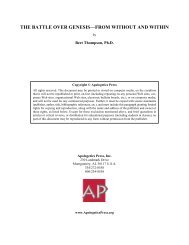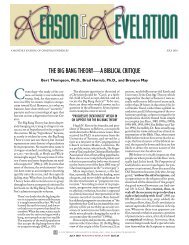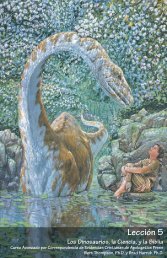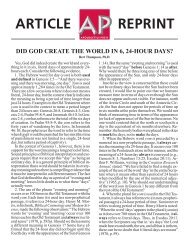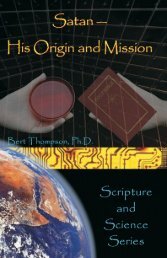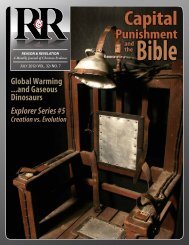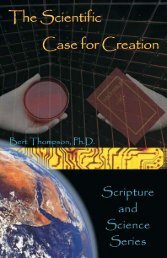The Many Faces, and Causes, of Unbelief - Apologetics Press
The Many Faces, and Causes, of Unbelief - Apologetics Press
The Many Faces, and Causes, of Unbelief - Apologetics Press
Create successful ePaper yourself
Turn your PDF publications into a flip-book with our unique Google optimized e-Paper software.
In America deism flourished after it had declined in<br />
Engl<strong>and</strong>. Thomas Jefferson, Benjamin Franklin, <strong>and</strong><br />
Thomas Paine are classed as deists.... Perhaps more<br />
than anywhere else in the United States, deistic tendencies<br />
<strong>of</strong> naturalism <strong>and</strong> Biblical criticism have lived<br />
on in modernistic or liberal Protestantism... (Geisler,<br />
1976, pp. 165-166).<br />
But why was such a system necessary? Basically deism came<br />
into existence as men attempted to work around the contradictions<br />
<strong>and</strong> internal inconsistencies posed by atheism <strong>and</strong><br />
agnosticism. <strong>The</strong> atheist was unable to disprove God’s existence,<br />
<strong>and</strong> the agnostic was forced to admit that while he might<br />
not be able to know that God exists, someone else certainly<br />
might possess such knowledge. Enter deism.<br />
<strong>The</strong> best way out <strong>of</strong> the dilemmas posed by atheism<br />
<strong>and</strong> agnosticism would appear to be the following:<br />
let us say that there is a God. This God created the<br />
world. He issued to the world a moral law, a code <strong>of</strong><br />
behavior which all <strong>of</strong> His creatures are supposed to<br />
follow. God will someday judge His creatures on how<br />
well they obeyed His comm<strong>and</strong>ments. In the meantime<br />
He does not interfere with His creation. He made<br />
it the way He wanted it to be, <strong>and</strong> He will not contradict<br />
His own will. For the moment, we worship God<br />
<strong>and</strong> try to live by His law, but we must not expect<br />
Him to do supernatural things for us (Corduan, 1993,<br />
p. 90).<br />
What, then, are the exact tenets <strong>of</strong> deism? Truth be told, at<br />
times those tenets are not at all easy to decipher.<br />
In the late seventeenth <strong>and</strong> in the eighteenth century<br />
more than a few thinkers came to be called deists or<br />
called themselves deists. <strong>The</strong>se men held a number<br />
<strong>of</strong> related views, but not all held every doctrine in<br />
common. John Locke, for example, did not reject<br />
the idea <strong>of</strong> revelation, but he did insist that human<br />
reason was to be used to judge it. Some deists, like Voltaire,<br />
were hostile to Christianity; some, like Locke,<br />
were not. Some believed in the immortality <strong>of</strong> the<br />
soul; some did not. Some believed God left his crea-<br />
-32



